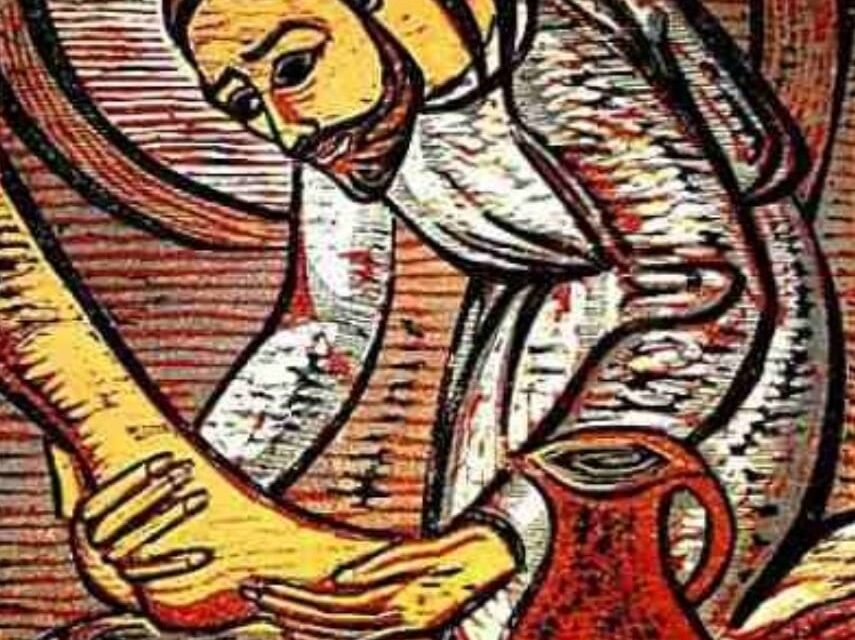The context for our Gospel reading in Mark 9 begins with the flawed theology and confession of Peter in 8:29. The theology and way of life in Jesus leads to the Cross just as the path to genuine Christian leadership, mission, renewal, revival, and greatness lies on the road to Calvary. In the words of Lesslie Newbigin, a Christian or a ‘church that sees the Cross of Jesus as the central event of history can never identify political (power or) order with the reign of God.’[1] The church is to call men and women to repent of their false loyalty to other powers especially in our modern culture. Calvary points us to the Lamb of God who’s bleeding love calls us to self-forgetting love unlike for the disciples and for most people of most ages, it lies along the road to ego inflation and self-centred love. The disciples just like many today did not have a firm grasp of how the kingdom of God was to work in relation to Jesus’ suffering, death, resurrection, and anticipation of His Second Coming. The Gospel reading in Mark 9 provides a clearer and missional approach and understanding of the nature of the struggle for power and influence in the church which goes on behind closed and opened doors and meetings.
Jesus was teaching the disciples, “The Son of Man is going to be delivered into the hands of men, and they will kill him. And when he is killed, after three days he will rise,” but the disciples “didn’t understand what He was talking about.” Jesus is not talking about Christian nationalist agenda or love without discretion. The disciple did not grasp what Jesus meant about suffering and death. Peradventure, they figured that Jesus was using metaphor, like when He told them to sell their possessions and give the money to the poor. The disciples did not really listen to what Jesus was saying because they did not really want to hear what He had to say. The truth is that, just like with many today, the disciples ‘already had well-entrenched opinions as to what religion was all about and they really didn’t want Jesus turning that on its head!’
While Jesus’ disciples were expected to assume the same missional role as Jesus, who took the form of a servant and became obedient unto death, their flawed theological understanding comes out when Jesus catches them discussing with each other ‘who is the greatest.’ The debate among the disciples points us to the different truth and true statements.[2] The theme of their discussion suggests a true statement, but is it truth? We can see the truth in Jesus’ words, “If any man desire to be the first, the same shall be last of all, and servant of all” (Mk 9:35). For the disciples, religion was about power games without genuine biblical and theological foundation and understanding. The disciples do not understand what must happen to Jesus and how they ought to be His followers (Mk 9:32). Today, are we different from Jesus’ disciples in our argument and struggle with the desire to be in control? Beloved, Jesus is not fooled by this form of disciples’ pride and their flawed theology Martin Luther called, “theologians of glory” that is ‘based on what we see in our experience and wisdom … the most common failure of modern culture in terms of understanding the goodness of humanity.’ What Jesus called his disciples into is what again Martin Luther called “theologians of the Cross.” Disciples as theologians of the Cross ‘we no longer attribute value to things or ourselves based on our natural senses or societal understandings. Instead we attribute value based on the word of God alone.’ In our world today, we have numerous attempts of people and groups ‘trying to further their own ambitions through leveraging off their religious communities and inserting God-talk into their party propaganda.’ The ambitious debate and dialogue of the disciples was totally incompatible with the teaching of Jesus. The reflection is, are there ways in which our power games in the church life, debate and dialogue today are incompatible with the teaching of Jesus? The disciples sense of shame as they kept silent over over their misunderstanding of Jesus’ ministry invites us to always be humble and try to distinguish the truth from otherwise true statements.
Human egos feeds on fear, unforgiveness, insecurity, pride, resentment and judgement. To overcome the disciples’ power games – ego inflation and ignorance, Jesus presents a child as the model for His disciples who want to be the most important, to tame their ego. Jesus expects it of us as well today. Jesus, putting His arm around a little child as a model of radical humility said, “Whoever wants to be first must be last of all and servant of all” (Mk 9:36). Jesus’ child’s proposal to the ambitious apostles as a kind of missional icon is a timeless missional principle. We are saved and called to serve as Christians in accordance with our deepest God’s holy nature just as children act in accordance with their deepest honest, trust, innocence, and independence nature. Every child is unique and special in its own way but they have some common missional characteristics namely, dependency and resilience. Children do not know how to be one way and act another.
True greatness beyond power games in church life is a matter of inward humility in spirit and heart. True greatness in this context is seen in the person who expresses his or her love for Jesus Christ by submitting to Him and not just clinging to what we know and what we are. Power games are shaped by a person’s position, race, colour, office, and leadership. To reflect Christ’s greatness, who ‘loved righteousness and hated iniquity’ called us to learn to be great in faith, humility, godly character, wisdom, self control, patience and love (Gal 5:22-23). To overcome power games in the church life invites us to be like a child, a model of humility. The child as model of radical humility helps us to see alternatives to our childish attitudes – self-centeredness, pettiness, rivalry, and overconfidence. God is calling us to overcome deception of acting with the zeal of warriors, pursuing self-indulgence with the passion of a true believer. God is calling the church to surrender as we prayerfully sing the hymn by Judson W. Van De Venter (1896) –
“All to Jesus I surrender, humbly at His feet I
bow.”
[1] Newbigin, Lesslie, Foolishness to the Greeks: The Gospel and Western Culture (London: SPCK, 1995), p. 125
[2] Huggins, Larry, The Believers Bible Companion (Tulsa: OK; Harrison House, 1984), p. 17











Recent Comments